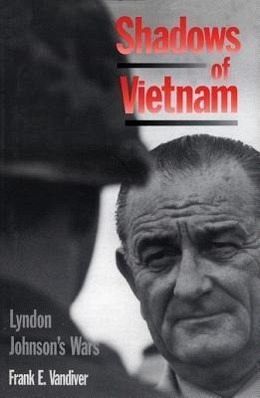
Shadows of Vietnam: Lyndon's Johnson's Wars
Versandkostenfrei!
Versandfertig in über 4 Wochen
22,99 €
inkl. MwSt.

PAYBACK Punkte
11 °P sammeln!
It is still not popular - perhaps it never will be - to be sympathetic to Lyndon Johnson. Vandiver stops short of that but is, in the tradition of the biographer, empathetic with him. Readers may disagree with some aspects of this thought-provoking portrayal, but, as Vandiver has done for Stonewall Jackson and Black Jack Pershing, he offers an understanding of a major wartime figure as he likely saw himself. His purpose is to show what Johnson knew, felt, feared, and tried to do. This, then, is the Vietnam War through Lyndon Johnson's eyes, with Vandiver providing perspective and the missing p...
It is still not popular - perhaps it never will be - to be sympathetic to Lyndon Johnson. Vandiver stops short of that but is, in the tradition of the biographer, empathetic with him. Readers may disagree with some aspects of this thought-provoking portrayal, but, as Vandiver has done for Stonewall Jackson and Black Jack Pershing, he offers an understanding of a major wartime figure as he likely saw himself. His purpose is to show what Johnson knew, felt, feared, and tried to do. This, then, is the Vietnam War through Lyndon Johnson's eyes, with Vandiver providing perspective and the missing puzzle pieces not available to Johnson at the time. Vandiver offers a broad, sweeping synthesis of the scholarship on Johnson's war presidency, along with new insights culled from numerous and extensive interviews and a far-reaching immersion in the primary documents housed in archives around the country. He provides an unusual combination of politico-military analysis with on-the-scene battle narratives, dramatically juxtaposing for the reader the reality in Vietnam with the perceptions of it in Washington. Compellingly addressing long-standing questions of whether the White House had become isolated from public opinion and whether Johnson was hardened to the voices raised against the war, Vandiver shows the president as a man who agonized, raged, and grew in response to crises in Vietnam and at home. In the most complete account yet of the period from late 1967 to LBJ's decision not to run for re-election, he probes the shifting honesty of the president's men on the Vietnam scene and identifies a playbill of White House villains who, over the years, have often been cast as heroes. He argues that Johnson entered the war honestly - fully believing that Russia and China were serious threats and convinced by his Tuesday Lunch advisors that aiding South Vietnam was essential to maintaining America's international reputationbut without confidence in his foreign policy role. In the end, Vandiver concludes that, tragically, had Johnson had the faith in his war instincts that he had on other fronts, he might have achieved his goals, emerging at last from the shadow of Vietnam.












